 As arrogant occupants of 21st-century Earth, who can rightly boast of creating exciting innovations, like the computer, talking paint, and the margarita blender, it serves us to believe we’re also the more enlightened generation.
As arrogant occupants of 21st-century Earth, who can rightly boast of creating exciting innovations, like the computer, talking paint, and the margarita blender, it serves us to believe we’re also the more enlightened generation.
But honesty demands an acknowledgment that contemporary applications of wisdom, morality and ethical behavior are in fact derivative of concepts first proposed long ago by the ancients.
Consider the 10,000-year-old Chinese wisdom, I Ching, The Book of Changes. Then there are the 5,000-year-old Upanishads from India. And of course, the new kid on the block, the four-millennia-old Mosaic Laws (Thou shalt not …). Indeed, no wisdom is handier than that of King Solomon, from the first millennium BCE in Ecclesiastes, Proverbs, and the Psalms.
It must be noted that much of this awesome introspection and self-awareness was first contemplated at a time when receding Ice Age glaciers were still carving Scotland’s Loch Ness and the Great Lakes of North America, on the threshold of the written word.
Alas, ethically and morally speaking, we moderns are merely the new models, not necessarily the better ones. Hold that thought. [Continue Reading]
